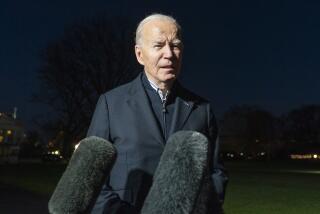U.S. forces fight militia in south Iraq
- Share via
BAGHDAD — U.S.-led forces battled Shiite Muslim militiamen in southern Iraq on Monday and killed at least 20 suspected fighters, the military said, while car bombs and other violence left at least 40 people dead in the capital.
Violence also erupted again in Samarra, north of Baghdad, the site of a bombing Wednesday that targeted a revered Shiite shrine and prompted officials to clamp curfews on Baghdad and Samarra. Police said four people died when a suicide bomber rammed his car into a Samarra school that was being used to house police officers.
A 24-hour curfew in Samarra was relaxed Saturday, and restrictions were in effect only from 8 p.m. to 7 a.m. The car bomber struck Monday afternoon.
Four suspects were arrested in connection with last week’s blast at the Golden Mosque in Samarra. A military statement said Iraqi forces detained the four Sunday during a raid that also turned up a compact disc showing attacks on U.S.-led troops, blasting caps and detonation wire, ID cards for access to the Golden Mosque and photographs depicting terrorist-training exercises.
Baghdad’s curfew was lifted Sunday. It had kept a lid on sectarian bloodshed and other violence, but police said Monday that in the first 24 hours after the curfew ended, the bodies of 33 men were found across the capital. All were believed to be victims of sectarian death squads.
Also Monday, the U.S. military announced the death of a soldier, bringing to at least 3,527 the number of American troops killed in Iraq since the invasion in March 2003, according to the website icasualties.org which tracks military casualties.
In the city of Fallouja in Al Anbar province west of Baghdad, two car bombs exploded in two markets. Police said at least 13 Iraqis died.
U.S.-led forces launched major attacks in the southern province of Maysan in what appeared to be a nationwide move against Shiite militiamen and Sunni Arab insurgents. The offensive began after the last of 28,500 extra troops ordered to Iraq as part of President Bush’s military buildup arrived this month.
Operations were launched over the weekend in areas surrounding Baghdad as the military sought to cut supply routes for Sunni insurgents moving arms and fighters into the capital. The battles in Maysan were aimed at Shiite militiamen loyal to radical cleric Muqtada Sadr.
U.S., British and Iraqi troops took part in the raids, which began early Monday and focused on two cities: the provincial capital, Amarah, and Majar Kabir, about 15 miles to the south. In April, the British occupying forces turned over Maysan province, an overwhelmingly Shiite region, to Iraqi forces. Since then, violence has increased as Sadr’s militiamen vie for control with members of a rival Shiite group.
U.S. military officials allege that the area is used by Sadr’s Al Mahdi militia to import arms and explosives from neighboring Iran, where they say Sadr has previously sought sanctuary to elude U.S. forces. A military statement said helicopter gunships provided backup to ground troops who came under fire from small arms and rocket-propelled grenades during the dawn raids. It said at least 20 suspected militia fighters were killed and six wounded.
Residents, though, said the casualties included civilians. “Many innocents were killed because, in the summer, most people sleep on the roofs to avoid the heat,” said Hamid Nouri, a clergyman and Sadr loyalist in Amarah.
A hospital official said 45 wounded were brought to the health facility run by Sadr in Amarah.
Four years after the U.S.-led invasion, Iraq has become the world’s second-most-unstable country behind Sudan, according to a private think tank in Washington. The 2007 Failed States Index, which is produced by the Fund for Peace, a research group, and Foreign Policy magazine, last year put Iraq in fourth place.
A U.S. official said Monday that two of the benchmarks originally sought by the White House to prove Iraqi political progress were virtually unachievable in the near term but that laws to share oil wealth and hold provincial elections were realistic goals.
Those laws should be passed by the end of next month, before the Iraqi parliament takes a summer break, said the U.S. Embassy official, who requested anonymity. The end of July also would be the deadline for lawmakers here to provide evidence to U.S. leaders that the Iraqis are making progress. The information would be needed in time for reports that are to be presented to Congress in September.
The official said a law that would restore former members of the ousted Baath Party to positions of authority in the government and military was far from being realized because of the “exposed wounds” left from Saddam Hussein’s Baathist regime.
Another benchmark -- a vote by residents of the northern city of Kirkuk and other disputed regions on whether to join the semiautonomous region of Kurdistan -- also is an unrealistic goal, the official said, noting the length of time needed to register voters for the proposed referendum.
In Washington, White House Press Secretary Tony Snow said President Bush held a 52-minute video teleconference Monday with Iraq’s prime minister, president and two vice presidents. Snow said Bush “once again reaffirmed the importance of political movement” toward reform in Iraq.
Times staff writer Raheem Salman and special correspondents in Baghdad, Maysan province and Fallouja contributed to this report.
More to Read
Sign up for Essential California
The most important California stories and recommendations in your inbox every morning.
You may occasionally receive promotional content from the Los Angeles Times.














